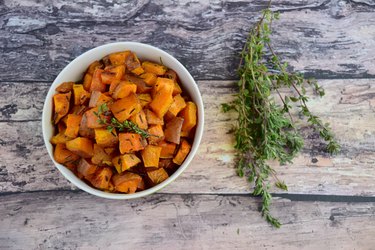
If you're trying to manage your weight, it's good to know that a medium sweet potato can be a healthy, almost fat-free addition to your diet without any cholesterol. Sweet potatoes are surprising low in calories and carbs. They are loaded with fiber and nutrients such as vitamins A and C.
Tip
Eating the skin of a baked sweet potato won't add calories, but you will get more fiber, which is important for maintaining digestive health.
Video of the Day
Sweet Potatoes for Weight Loss
Sweet potatoes are a tuber vegetable with a thin copper-colored skin and bright orange flesh, although different varieties can range in color, including dark red, brown, purple, yellow or white. Sweet potato can be a healthy alternative to the common baked potato. If you are following a weight-loss plan, a cooked sweet potato contains fewer calories than a white potato. A medium sweet potato, 5 inches long, contains 103 calories, while a medium-sized baked potato delivers 163 calories, according to USDA.
Video of the Day
Depending on the level of activity and age, Dietary Guidelines recommends adult men get between 2,000 and 3,000 calories and women try for between 1,600 and 2,400 calories a day. Sweet potato calories contribute 5 percent of the daily value (DV) per serving on a 2,000 calorie per day diet.
A cooked sweet potato contains minimal fat and no cholesterol, making it a good choice for a heart-healthy snack. Just don't be tempted to load your potato up with butter, bacon bits, sour cream or other fatty foods that may increase the calorie content. A sprinkle of herb-flavored olive oil is a better option, or liven up your potato with cinnamon, cilantro or cayenne pepper for variety.
Read More: Recommended Caloric Intake for Weight Loss
Good For Digestion
Sweet potatoes are a rich source of dietary fiber, which not only ensures the health of your digestive system, it may help reduce the risk of obesity, diabetes and heart disease, according to Mayo Clinic. Fiber is found in the skin as well as the flesh of sweet potatoes. A medium baked sweet potato contributes 3.8 grams of fiber, or 15 percent of your DV, according to USDA.
Fiber is the part of food that your body cannot digest effectively, so it travels relatively intact through your digestive system, adding bulk and absorbing fluid to help other foods move easily. This can help prevent constipation and other associated problems, such as hemorrhoids and anal fissures.
Because fiber slows digestion, it can help you feel full longer, which means you're less likely to eat too much. If you feel satiated, you can keep your hunger pangs at bay and may not be tempted to snack between meals, which means a lower overall calorie intake at the end of the day.
Key Nutrients and Antioxidants
Sweet potatoes contain many important vitamins and minerals. One of the major sweet potato benefits comes from the antioxidants they contain. Antioxidants help fight free radicals, which are byproducts from metabolism in your body and from environmental factors. Insufficient antioxidant levels may accelerate the aging process and some of the diseases associated with it, including heart disease.
An important antioxidant in sweet potatoes is beta carotene, which is responsible for the vegetables' bright orange color. A medium sweet potato contains 121 percent of your recommended daily allowance for beta carotene, lists USDA.
Beta carotene is converted into vitamin A in your body and plays a significant role in supporting your immune system. Vitamin A is also needed for normal vision and reproduction. National Institutes of Health says vitamin A helps the heart, lungs, kidneys and other organs work properly.
Another potent antioxidant that's needed to boost your immune system is vitamin E. The 5 percent of your daily value of vitamin E contained in one baked sweet potato helps your body fight off invading bacteria and viruses. Vitamin E helps to widen blood vessels to prevent blood from clotting and helps cells interact with each other.
Vitamin K also contributes to the antioxidant sweet potato benefits, supplying 2 percent of the DV. In addition, according to USDA, one baked sweet potato nutrition facts include:
- Calcium: 3 percent of the DV
- Iron: 4 percent of the DV
- Potassium: 12 percent of the DV
- Magnesium: 7 percent of the DV
- Copper: 20 percent of the DV
- Manganese: 25 percent of the DV
- Thiamine: 10 percent of the daily value
- Riboflavin: 9 percent of the DV
- Niacin: 11 percent of the DV
- Vitamin B6: 19 percent of the DV
Although the above content is very similar to raw sweet potato nutrition, the vegetable is typically eaten cooked. Sweet potato can be prepared in a number of ways such as baked, boiled, roasted or mashed, making them a versatile replacement for white potatoes.
- MyFoodData: "Nutrition Comparison of Baked Potatoes and Cooked Sweet Potatoes"
- Dietary Guidelines: "Appendix 2. Estimated Calorie Needs per Day, by Age, Sex, and Physical Activity Level"
- MayoClinic: Nutrition and Healthy Eating: "Chart of High-Fiber Foods"
- National Institute of Diabetes and Digestive and Kidney Diseases: "Eating, Diet, & Nutrition for Hemorrhoids"
- MayoClinic: "Anal Fissure"
- Biology and Medicine: "Free Radicals, Antioxidants and Disease"
- National Institutes of Health: "Vitamin A"
- National Institutes of Health: "Vitamin E"
- Texas A&M University: What Is the Difference between a Sweet Potato and a Yam?